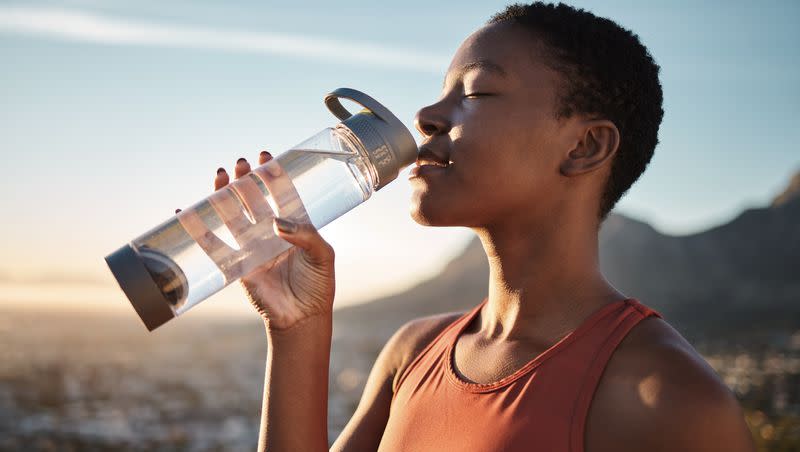What happens when you don’t stay hydrated?

Growing up, every time I complained of a headache, the words that would follow out of my mother’s mouth 99% of the time were, “You’re probably dehydrated. Drink some water.”
Now that I don’t have my mom around all the time telling me to drink water, I try my best to have my water bottle next to me as much as I can.
The hashtag #emotionalsupportwaterbottle has amassed over 300 million views on TikTok, with videos like Hailey Bieber sharing her morning routine that isn’t complete without her water bottle and a mom having a public meltdown after losing her water bottle. It’s never been trendier to be hydrated.
How much water should you have a day?
Our bodies are about 60% water, but “the amount of water in the body can change slightly with age, sex and hydration levels,” per Medical News Today.
According to Health Direct, here is a general rule on how much fluid a person needs each day:
Adult males: 10 cups of fluid a day.
Adult females: 8 cups a day or 9 if you are pregnant or breastfeeding.
Teenagers: 6-8 cups a day.
Children: 4-5 cups a day.
It is important to note that depending on age and health, the amount of water needed for a person can vary, but children and older adults are more at risk of dehydration.
“The most common cause of dehydration in young children is severe diarrhea and vomiting. Older adults naturally have a lower volume of water in their bodies and may have conditions or take medications that increase the risk of dehydration,” per the Mayo Clinic.
Why does our body need so much water?
Water plays a vital role in every part of our body. USGS.gov shared a list of functions water does when in our bodies:
Lubricates our joints.
Provides nutrients for every cell.
Creates saliva.
Flushes waste out of our body.
Works as a shock absorber for body parts like the brain and spinal chord.
Transports carbs and proteins through the body through the bloodstream for our body to process.
Regulates body temperature through sweating.
Related
What happens to your body when it’s dehydrated?
Perhaps the most common symptom of dehydration is fatigue. If you haven’t had enough water, odds are by the afternoon, you’ll be wanting a nap. The most common reason a person gets fatigued during the middle of the day is due to dehydration, according to DripDrop.
Other common warning signs that your body is dehydrated include:
Excessive thirst.
Dark-colored urine or less urination.
Dizziness.
Trouble concentrating.
If you experience severe symptoms such as vomit and diarrhea, contact your healthcare professional for medical attention.
How to prevent dehydration
According to a study in the National Library of Medicine on adult dehydration, “75% of Americans are chronically dehydrated.”
“We lose water every day through natural bodily functions, but dehydration occurs when we lose more bodily fluids than we’re taking in,” Jennifer Williams, Ohio–based research scientist and hydration expert at Abbott told Everyday Health.
“Because humans are made up of mostly water and electrolytes, we need to maintain the proper balance of these in our system,” Williams added.
Thankfully, you don't have to be constantly drinking to stay hydrated. Certain foods are also a great source for combatting dehydration. Fruits and vegetables are foods with a high water content that can help increase fluid intake without feeling like you're having to drink a gallon of water a day.
According to EatingWell, the No. 1 food dieticians say helps with dehydration is salted peanuts for their rich electrolyte content.
Fruits and vegetables are foods with a high water content that can help increase fluid intake without feeling like you're having to drink a gallon of water a day.
“Electrolytes will make sure that your body is actually absorbing water instead of allowing it to just run right through you,” dietitian-nutritionist Laney Morse told EatingWell.
Everyday Health shared ways to keep up with your fluid levels in order to avoid dehydration:
Drink when you feel thirsty.
Increase fluid intake when exercising.
Ensure you are getting enough electrolytes in your diet.
Drink more when sick.
Drink more when in hotter temperatures.
Understand that many liquids count when it comes to dehydration.
Begin drinking water as soon as you wake up.
